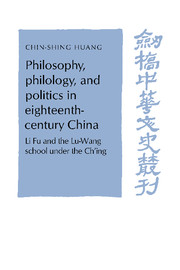 Philosophy, Philology, and Politics in Eighteenth-Century China
Philosophy, Philology, and Politics in Eighteenth-Century China Book contents
- Frontmatter
- Contents
- Foreword by Professor Ying-shih Yü
- Acknowledgments
- Abbreviations
- Introduction
- 1 The original argument (1): “Chu Hsi versus Lu Hsiang-shan” (Chu-Lu i-t'ung): A philosophical interpretation
- 2 The original argument (2): Wang Yang-ming and the problematic of “Chu Hsi versus Lu Hsiang-shan”
- 3 The critical dimension in the Confucian mode of thinking: The conception of the Way as the basis for criticism of the political establishment
- 4 Li Fu: an exemplary Lu-Wang scholar in the Ch'ing dynasty (1): His life
- 5 Li Fu: an exemplary Lu-Wang scholar in the Ch'ing dynasty (2): His thought
- 6 Li Fu and the philological turn
- 7 The price of having a sage-emperor: the assimilation of the tradition of the Way by the political establishment in the light of the K'ang-hsi emperor's governance
- Conclusion
- Chinese glossary
- Bibliography
- Index
5 - Li Fu: an exemplary Lu-Wang scholar in the Ch'ing dynasty (2): His thought
Published online by Cambridge University Press: 17 September 2009
- Frontmatter
- Contents
- Foreword by Professor Ying-shih Yü
- Acknowledgments
- Abbreviations
- Introduction
- 1 The original argument (1): “Chu Hsi versus Lu Hsiang-shan” (Chu-Lu i-t'ung): A philosophical interpretation
- 2 The original argument (2): Wang Yang-ming and the problematic of “Chu Hsi versus Lu Hsiang-shan”
- 3 The critical dimension in the Confucian mode of thinking: The conception of the Way as the basis for criticism of the political establishment
- 4 Li Fu: an exemplary Lu-Wang scholar in the Ch'ing dynasty (1): His life
- 5 Li Fu: an exemplary Lu-Wang scholar in the Ch'ing dynasty (2): His thought
- 6 Li Fu and the philological turn
- 7 The price of having a sage-emperor: the assimilation of the tradition of the Way by the political establishment in the light of the K'ang-hsi emperor's governance
- Conclusion
- Chinese glossary
- Bibliography
- Index
Summary
His conception of destiny (ming)
In discussing Li Fu's thought, it may be useful to start with what he believes can and cannot be accomplished during a person's lifetime. His notion of destiny reveals his perception of the limits of human effort in general and of moral practice in particular. In his view, people who lack a correct understanding of the meaning of destiny cannot become sages or wise men. Some of these people neither believe nor trust in the operation of destiny. They think that a person can pursue the good and avoid disasters at one's will. On the other hand, others assign too great a role to destiny. Believing that everything is predetermined, they simply submit themselves to the hands of destiny. Both ideas are incorrect, according to Li Fu.
A clear discussion of the nature of destiny seems superfluous to those who already reside in the zone of virtue; but it is absolutely necessary for those who are immersed in material desires, but willing to learn. The strategy used to enlighten the latter is to teach them an appropriate belief in destiny. This is not to suggest that one should simply become obsessed with fortune and misfortune. Instead, one should engage oneself in the sages' Way. A second task is to show that the good are remunerated with blessing and the evil with calamity. Only after realizing these truths can one be virtuous. At first glance these two tasks appear to be contradictory, but they are not.
- Type
- Chapter
- Information
- Philosophy, Philology, and Politics in Eighteenth-Century ChinaLi Fu and the Lu-Wang School under the Ch'ing, pp. 77 - 106Publisher: Cambridge University PressPrint publication year: 1995


